

 中文摘要:
中文摘要:
采用含毒介质培养法及菌丝生长速率法,研究了2株人参生防真菌FSR-74和FSR-97发酵液的稳定性.结果表明:2株生防真菌发酵液的热稳定性较弱,其发酵液在低温下(≤40℃)抑菌活性稳定,在中高温下(〉40℃)抑菌活性逐渐下降乃至失活;2株生防真菌发酵液的酸碱稳定性较差,在pH〈5或pH〉9的条件下其抑菌活性逐渐减弱;生防真菌FSR-74发酵液具有较强的紫外稳定性,但生防真菌FSR-97发酵液的紫外稳定性较弱;生防真菌FSR-74和FSR-97发酵液具有较好的低温储藏稳定性,室温下随储藏时间的延长对人参病原菌的抑菌率均显著下降;2株生防真菌发酵液抗胰蛋白酶稳定性较差;生防真菌FSR-74和FSR-97均具有良好的传代稳定性.生防真菌FSR-74和FSR-97的代谢产物有较强的低温储藏稳定性,具有一定开发价值,在不同植物病害防治应用中应在合理的温度、光照及pH范围内使用.
 英文摘要:
英文摘要:
By means of containing poisonous medium culture and myeelial growth rate method, the stabilities of fermentation broths from antagonistic fungi strains FSR-74 and FSR-97 of Panax ginseng were studied. The results showed that thermal stability of fermentation broths from FSR-74 and FSR- 97 was stable less than 40℃ and the activities were decreased gradually or lost in high temperature (〉40℃). The pH stability of fermentation broths from FSR-74 and FSR-97 was poor, and its antimicrobial activity was weakened gradually in the condition of pHi5 or pHi9. UV stability of FSR-74 fermentation broth was stronger while weaker for FSR-97 fermentation broth. The fermentation broths from FSR-74 and FSR-97 were stable when storing in low temperature. The inhibition rates of FSR-74 and FSR-97 fermentation broths against ginseng pathogens was decreased significantly with the extension of storage time when storing in room temperature. Meanwhile, the fermentation broths from FSR-74 and FSR-97 were astable to trypsin K, while the antimicrobial activity of fermentation broths had no significant changes when the two strains were transferred for 10 generations. The active substances fermented by FSR-74 and FSR-97 with better storing stability have a value for development. As well as the temperature, illumination and pH must be controlled in a proper range in the prevention and control of plant diseases.
 同期刊论文项目
同期刊论文项目
 同项目期刊论文
同项目期刊论文
 期刊信息
期刊信息
